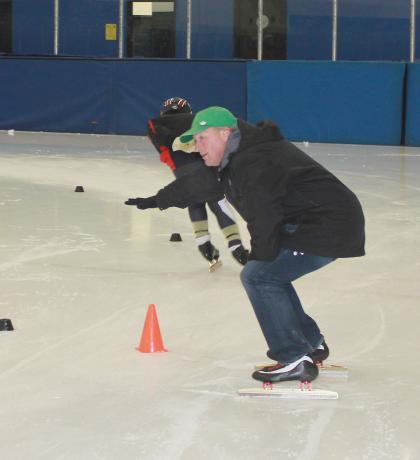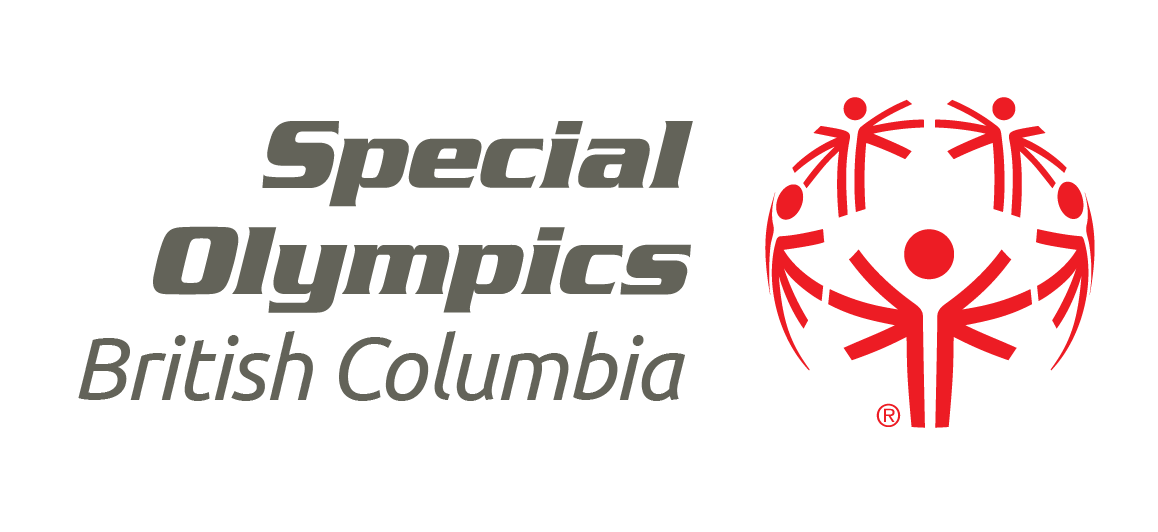
Special Olympics BC athletes and coaches took to the ice with sharpened skates and came away with sharpened skills from the third Performance Project speed skating camp. The camp, which involved world-class sport experts and a new strength and conditioning component, took place in Coquitlam on Sunday, December 8.
Returning from the first two camps were 17 athletes from Coquitlam, Langley, Abbotsford, Vancouver, and Victoria along with great speed skating coaches. As well, a young athlete from SOBC – Coquitlam – one of three athletes under the age of 11 in the camp – was fresh to the roster.
Athletes had the opportunity to benefit from a strength and conditioning coach for the first time at a speed skating camp. Aaron Chew, Assistant Strength Coach in the SFU Speed, Strength, and Conditioning Centre, worked with the athletes at the Pinetree Community Centre in Coquitlam to help them develop their power and core strength for better on-ice performance. Chew is enthusiastic about working with Special Olympics athletes and is also giving his time to assist Team BC athletes and coaches.
Internationally recognized speed skating expert Jacques Thibault and high-performance leaders from the Allinger Consulting International team were once again involved in the camp, sharing their cutting-edge expertise with the participating athletes and coaches.
SOBC – Richmond athlete Nicky Chow, who is a weightlifter as well as a skater, was pleased with the new strength and conditioning part of the camp, saying that his own weight training has greatly helped his on-ice performance.
“It’s a really good program to build off of for your mental and your physical,” Chow said of the camp overall. The young athlete said he improved his crossover technique and learned how to bend lower to get more speed during the on-ice training at Planet Ice Coquitlam. And he particularly values the mental training that is part of each session, helping him be more confident and focus on achieving his goals.
“[It was] awesome,” said SOBC – Victoria athlete Chris Thorpe of the camp. “I like practicing for competitions.” Thorpe benefited from the targeted performance work, saying he practiced his starts and strides, and made gains in his crossover technique.
One of his favourite parts was meeting up with the friends from other communities that he’s made at previous camps.
Thibault gave the athletes and coaches great insights into improving everything from equipment to technique. He is a significant figure in the speed skating world as a former national team coach and Olympian, former Olympic Oval General Manager, and member of the Speed Skating Canada Hall of Fame.
He and the Allinger team are world-class experts sought out by the Russian Olympic Committee to work with their athletes and programs in advance of the 2014 Olympic and Paralympic Winter Games in Sochi.
Sunday’s camp also included functional testing for the athletes, involving tests used as guidelines to develop corrective exercises for body imbalances. These tests have also set standards that are being used to track their performance improvements throughout the series of camps. Video analysis was again available as well so that coaches can give specific feedback to athletes after the camp.
“I’m looking forward to improving and building on what I learned,” Chow says, anticipating the next speed skating camp. He also thinks that the performance camp has been helping him improve his speed for the upcoming 2014 Regional Qualifiers — all the athletes who have been involved with the Performance Project camps will participate in the Speed Skating Regional Qualifier in Coquitlam on February 2.
The next Performance Project speed skating camp will take place March 29 in Coquitlam.
